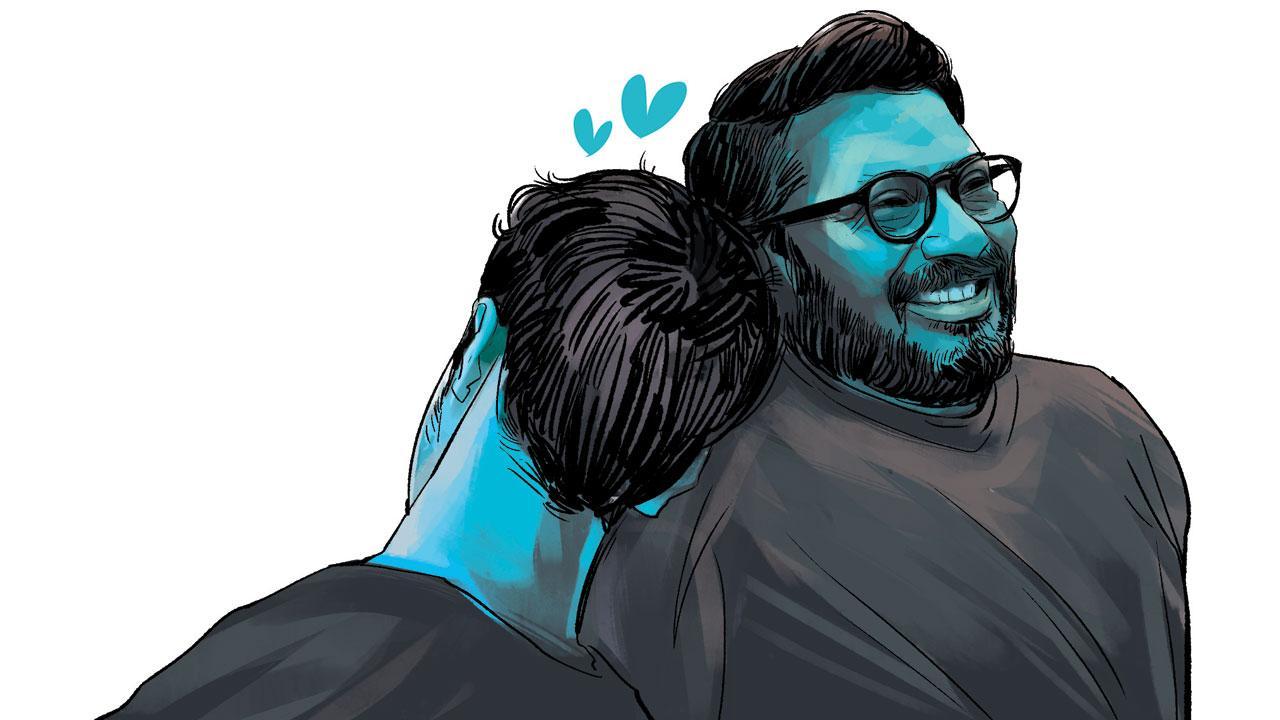Onir studied at Jadavpur University in Kolkata, and did an editing course in Berlin, before moving to Mumbai.

Illustration/Uday Mohite
![]() I’ve had gay friends since decades—I believe everyone’s love/sex life is private, hetero or gay. Filmmaker Onir’s memoir I Am Onir, & I Am Gay, written by Onir* with his editor-sister Irene Dhar Malik (Penguin/Viking, R599), is refreshing reading. It offers insights into the life and art of one of India’s few openly gay filmmakers in Hindi cinema. You see how a mainly heterosexual society holds the queer community in a chokehold, yet Onir slips out of it every time, bounces back and keeps doing what he does best—make films. His book would also be cathartic and inspirational for the LGBTQI+ community; as well as for every outsider, without any filmi connections, who wants to break into Bollywood/Hindi cinema, and unapologetically live life on his/her own terms.
I’ve had gay friends since decades—I believe everyone’s love/sex life is private, hetero or gay. Filmmaker Onir’s memoir I Am Onir, & I Am Gay, written by Onir* with his editor-sister Irene Dhar Malik (Penguin/Viking, R599), is refreshing reading. It offers insights into the life and art of one of India’s few openly gay filmmakers in Hindi cinema. You see how a mainly heterosexual society holds the queer community in a chokehold, yet Onir slips out of it every time, bounces back and keeps doing what he does best—make films. His book would also be cathartic and inspirational for the LGBTQI+ community; as well as for every outsider, without any filmi connections, who wants to break into Bollywood/Hindi cinema, and unapologetically live life on his/her own terms.
ADVERTISEMENT
Onir (Anirban Dhar) has made over nine films, mostly produced by unwavering friend, producer-actor Sanjay Suri. His films as director include the landmark My Brother…Nikhil (2005), with a gay protagonist, distributed by Yash Raj Films; Sorry Bhai! and I Am. His cast has included Shabana Azmi, Juhi Chawla, Manisha Koirala, Urmila Matondkar, Raveena Tandon, Sanjay Suri, and others. That’s a long way to come for a youngster who grew up in Bhutan. His father, from Sylhet in Bangladesh, who was a Leftist political prisoner there from 1948-1955, initially moved to India, then became a school principal in Bhutan (Onir’s mother grew up in Odisha). Onir studied at Jadavpur University in Kolkata, and did an editing course in Berlin, before moving to Mumbai.
Memoirs/ autobiographies by the Indian LGBTQI+ community are a growing field, including Siddharth Dube’s No One Else: A Personal History of Outlawed Love and Sex,** Sunil Gupta’s Wish You Were Here: Memories Of A Gay Life, Hoshang Merchant’s The Man Who Would Be Queen, Vivek Tejuja’s So Now You Know: A Memoir of Growing up Gay in India and Laxminarayan Tripathi’s Me Hijra, Me Laxmi (translated from Marathi). Onir’s book is a welcome addition. “Imagine growing up in a world where you never heard stories about yourself... never present in cinema or TV, apart from being ridiculed,” Onir writes. His sensitive cinema is partly devoted to making the voice of gays and other marginalised people heard. He writes about how My Brother Nikhil, I Am and Shab, all with key LGBTQIA characters, were made when homosexuality was criminalised by law; ironically, after the Supreme Court decriminalised homosexuality in 2018, Onir’s We Are (on a gay former army officer) was refused an NOC by the Ministry of Defence. Yet, he is now making Pine Cone, “which is not seeking acceptance or approval from the heteronormative world.” He also discusses the challenges of making independent cinema, including nightmarish censors and distribution.
His first crush in Calcutta, at 17, was followed by a series of relationships and heartbreaks with men, some brief, some with men who betrayed him, others with men who had girlfriends or were soon to marry a girl. Although the false accusation (later withdrawn) of him molesting someone in 2011 scarred him deeply, his parents, sister, Sanjay Suri and his wife Ambika, his landlady, and many friends stood squarely by him. He felt vindicated when he won the National Award for Best Hindi Film for I Am in 2012. I would have traded a few of the relationships, to learn more about how his family dealt with his homosexuality; how Suri came to be his rock-solid producer, and the challenges of representation, casting heterosexuals as gays—but perhaps publishers deem otherwise. Certainly, a worthy book.
*Disclosure: Onir was a guest at World Cinema Amsterdam’s Soul of India, for which I was Curator in 2011, screening I Am.
** I was Researcher on HIV for Siddharth Dube’s book No One Else: A Personal History of Outlawed Love and Sex, 2015
Meenakshi Shedde is India and South Asia Delegate to the Berlin International Film Festival, National Award-winning critic, curator to festivals worldwide and journalist.
Reach her at meenakshi.shedde@mid-day.com
 Subscribe today by clicking the link and stay updated with the latest news!" Click here!
Subscribe today by clicking the link and stay updated with the latest news!" Click here!







